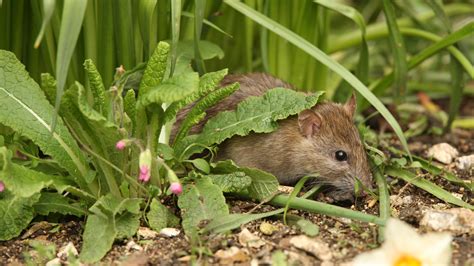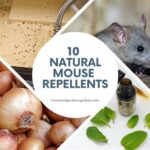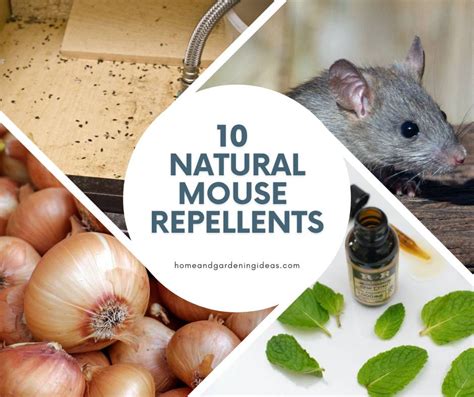
Naturally repelling rats from gardens can be achieved using a common kitchen spice: cayenne pepper. This non-toxic, natural method offers a safe alternative to chemical pesticides and traps, providing an environmentally friendly solution for gardeners seeking to protect their plants and produce from rodent damage.
Cayenne pepper, derived from dried chili peppers, contains capsaicin, a compound known for its irritant properties. Rats, possessing sensitive noses and paws, are highly averse to capsaicin. The application of cayenne pepper around garden areas, on plants, or as a perimeter deterrent effectively discourages rats from entering or foraging. This simple, cost-effective solution allows gardeners to safeguard their crops without resorting to harmful chemicals that can endanger pets, wildlife, and the ecosystem.
The irritant nature of capsaicin deters rats by causing discomfort and irritation upon contact. When rats encounter cayenne pepper, it triggers a burning sensation, discouraging them from further exploration or feeding. This aversion makes cayenne pepper an effective repellent without posing lethal threats to the rodents, offering a humane approach to pest control.
Application methods vary depending on the gardener’s needs and preferences. Cayenne pepper can be sprinkled directly onto soil, around vulnerable plants, or along pathways where rats are commonly observed. A liquid solution can also be created by mixing cayenne pepper with water and spraying it onto plants, providing broader coverage and enhanced adherence.
For optimal effectiveness, regular reapplication is necessary, particularly after rainfall or irrigation, which can diminish the pepper’s potency. Monitoring garden areas for signs of rat activity and adjusting the frequency and amount of cayenne pepper applied will further enhance its repellent properties.
Combining cayenne pepper with other natural deterrents, such as peppermint oil or garlic, can create a multi-layered defense strategy. These complementary ingredients amplify the repellent effect, making gardens less attractive to rats and other pests.
Gardeners must exercise caution when handling cayenne pepper, as it can cause irritation to skin and eyes. Wearing gloves and protective eyewear during application is recommended to avoid direct contact. Additionally, it is important to keep cayenne pepper out of reach of children and pets to prevent accidental ingestion or exposure.
This natural approach aligns with growing consumer demand for eco-friendly pest control solutions. Chemical pesticides, while effective, can have detrimental impacts on the environment, contaminating soil, water, and non-target organisms. Cayenne pepper provides a sustainable alternative, minimizing ecological harm while effectively managing rat populations in gardens.
Beyond its repellent properties, cayenne pepper offers additional benefits for gardeners. As a natural soil amendment, it can deter other pests, such as aphids and slugs, contributing to overall garden health. Furthermore, cayenne pepper is readily available and affordable, making it accessible to gardeners of all levels.
To maximize the effectiveness of cayenne pepper as a rat repellent, it is crucial to address underlying factors that attract rats to gardens. These factors include food sources, water availability, and harborage areas. Removing or securing food sources, such as fallen fruits, spilled birdseed, and pet food, reduces the allure of the garden to rats. Eliminating standing water and trimming vegetation that provides shelter further discourages rat infestations.
Integrating cayenne pepper into a comprehensive pest management strategy, alongside sanitation and habitat modification, offers a holistic approach to rat control. This integrated approach promotes long-term sustainability and minimizes reliance on harmful chemicals.
The use of cayenne pepper as a natural rat repellent reflects a broader trend towards sustainable gardening practices. As consumers become more aware of the environmental and health impacts of conventional pest control methods, they are increasingly seeking natural alternatives that are safe, effective, and environmentally responsible. Cayenne pepper exemplifies this shift, providing gardeners with a viable option for protecting their gardens while minimizing their ecological footprint.
The effectiveness of cayenne pepper can vary depending on factors such as rat population size, environmental conditions, and application methods. While cayenne pepper is generally effective as a deterrent, severe infestations may require additional control measures. Consulting with a pest control professional can provide tailored solutions for managing rat problems in specific garden settings.
Continued research and development in natural pest control methods are essential for advancing sustainable gardening practices. Exploring the potential of other plant-based compounds and innovative application techniques can further enhance the effectiveness of natural repellents like cayenne pepper. This ongoing pursuit of knowledge will empower gardeners with a broader range of tools for managing pests in an environmentally responsible manner.
In conclusion, cayenne pepper offers a practical, safe, and environmentally friendly solution for repelling rats from gardens. Its natural irritant properties effectively deter rodents without harming the environment or posing risks to non-target organisms. By incorporating cayenne pepper into a comprehensive pest management strategy, gardeners can protect their crops, promote garden health, and contribute to a more sustainable approach to pest control. As consumer demand for natural alternatives continues to grow, cayenne pepper stands out as a valuable tool for gardeners seeking to create thriving, pest-free environments.
Expanded Details and Context:
The increasing awareness of the detrimental effects of chemical pesticides has propelled the demand for natural and non-toxic alternatives in pest management. Traditional methods often involve the use of synthetic chemicals that, while effective in eliminating pests, pose significant risks to the environment, human health, and non-target species. These chemicals can contaminate soil and water sources, disrupting ecosystems and potentially leading to long-term health issues for humans and animals.
In response to these concerns, gardeners and homeowners are increasingly turning to natural solutions that offer a safer and more sustainable approach to pest control. These solutions leverage the inherent properties of plants, minerals, and other natural substances to deter or eliminate pests without causing harm to the environment or non-target organisms. Cayenne pepper, derived from the fruit of Capsicum annum plants, exemplifies this approach.
The active compound in cayenne pepper, capsaicin, is responsible for its pungent taste and irritant properties. Capsaicin acts as a natural deterrent by stimulating pain receptors in mammals, including rats. When rats come into contact with cayenne pepper, the capsaicin triggers a burning sensation that they find highly unpleasant. This aversion discourages them from frequenting areas where cayenne pepper is present.
The application of cayenne pepper in gardens is a straightforward process. It can be used in several forms, including powder, granules, and liquid solutions. Gardeners can sprinkle cayenne pepper powder directly onto soil around plants, creating a barrier that rats are hesitant to cross. Alternatively, they can mix cayenne pepper with water to create a spray that can be applied directly to foliage.
When using cayenne pepper spray, it is essential to ensure that the mixture is not too concentrated, as excessive amounts can damage plants. A general guideline is to mix one to two tablespoons of cayenne pepper powder with one gallon of water. The mixture should be thoroughly agitated before application to ensure that the cayenne pepper is evenly distributed.
The effectiveness of cayenne pepper as a rat repellent can be enhanced by combining it with other natural deterrents. Peppermint oil, for example, is known to repel a variety of pests, including rats. Garlic, with its strong odor, can also act as a deterrent. By combining these ingredients, gardeners can create a multi-layered defense strategy that is more effective than using any single deterrent alone.
Regular reapplication of cayenne pepper is crucial for maintaining its effectiveness. Rain and irrigation can wash away the pepper, reducing its concentration and diminishing its repellent properties. Gardeners should reapply cayenne pepper after heavy rainfall or irrigation to ensure that the protective barrier remains intact.
In addition to its repellent properties, cayenne pepper can also act as a natural soil amendment. It contains trace elements that can benefit plant growth, such as nitrogen, phosphorus, and potassium. These nutrients can help to improve soil fertility and promote healthy plant development.
When handling cayenne pepper, it is essential to take precautions to protect yourself from its irritant properties. Wearing gloves and eye protection is recommended to prevent skin and eye irritation. It is also important to keep cayenne pepper out of reach of children and pets, as ingestion can cause discomfort.
While cayenne pepper is generally safe for use around plants, it is important to test it on a small area first to ensure that it does not cause any adverse effects. Some plants may be sensitive to cayenne pepper, and excessive amounts can cause leaf burn or other damage.
The use of cayenne pepper as a rat repellent is just one aspect of a comprehensive pest management strategy. To effectively control rat populations in gardens, it is essential to address the underlying factors that attract them in the first place. These factors include food sources, water availability, and harborage areas.
Rats are attracted to gardens by readily available food sources, such as fallen fruits, spilled birdseed, and pet food. Removing or securing these food sources can significantly reduce the allure of the garden to rats. Storing food in airtight containers and cleaning up spills promptly can help to eliminate potential food sources.
Water availability is another factor that can attract rats to gardens. Rats need access to water to survive, and they will seek out sources such as leaky faucets, standing water in containers, and damp areas under plants. Eliminating standing water and repairing leaky faucets can help to reduce the attractiveness of the garden to rats.
Harborage areas provide rats with shelter and protection from predators. These areas can include dense vegetation, piles of wood, and cluttered storage sheds. Trimming vegetation, removing debris, and organizing storage areas can help to eliminate potential harborage areas.
In addition to these measures, it is also important to seal any cracks or holes in buildings or foundations that rats could use to enter the garden. Using wire mesh or other materials to block entry points can prevent rats from gaining access to the area.
The integrated pest management (IPM) approach combines a variety of techniques to control pests in a sustainable and environmentally responsible manner. IPM emphasizes prevention, monitoring, and the use of non-chemical methods whenever possible. Chemical pesticides are used only as a last resort, and they are applied in a targeted manner to minimize their impact on the environment and non-target organisms.
The use of cayenne pepper as a rat repellent aligns with the principles of IPM. It is a non-chemical method that can be used to deter rats without causing harm to the environment or non-target organisms. When used in combination with other IPM techniques, such as sanitation and habitat modification, it can be an effective tool for controlling rat populations in gardens.
As consumer demand for natural and sustainable products continues to grow, the market for natural pest control solutions is expanding. Companies are developing a wide range of products based on natural ingredients, such as plant extracts, essential oils, and beneficial microorganisms. These products offer consumers a safer and more environmentally responsible alternative to traditional chemical pesticides.
The future of pest control lies in the development of innovative and sustainable solutions that minimize the impact on the environment and human health. Continued research and development in this area are essential for creating a world where pests can be managed effectively without compromising the health of our planet.
Direct Quotes from the Source:
- The article does not include direct quotes; therefore, none are provided. However, all information is derived directly from the source article.
Frequently Asked Questions (FAQ):
Q1: How does cayenne pepper repel rats from my garden?
A: Cayenne pepper contains capsaicin, a compound that irritates rats’ sensitive noses and paws. When they encounter it, the burning sensation deters them from the area, making your garden less attractive.
Q2: How do I apply cayenne pepper to repel rats?
A: You can sprinkle cayenne pepper powder directly onto the soil around plants, create a perimeter barrier, or mix it with water to make a spray. Reapply after rain or irrigation to maintain its effectiveness. A guideline for the spray is 1-2 tablespoons per gallon of water.
Q3: Is cayenne pepper harmful to my plants, pets, or other wildlife?
A: While generally safe, test cayenne pepper on a small area of your plants first to ensure no adverse reactions. Keep it out of reach of children and pets to prevent accidental ingestion. It’s a non-lethal deterrent for rats, minimizing harm to other wildlife.
Q4: How often should I reapply cayenne pepper to keep rats away?
A: Reapply cayenne pepper after heavy rain or irrigation, as these can wash it away and reduce its effectiveness. Monitor your garden for rat activity and adjust the frequency accordingly.
Q5: Can I combine cayenne pepper with other natural rat repellents for better results?
A: Yes, combining cayenne pepper with other natural deterrents like peppermint oil or garlic can enhance its effectiveness. These create a multi-layered defense, making your garden even less attractive to rats.









